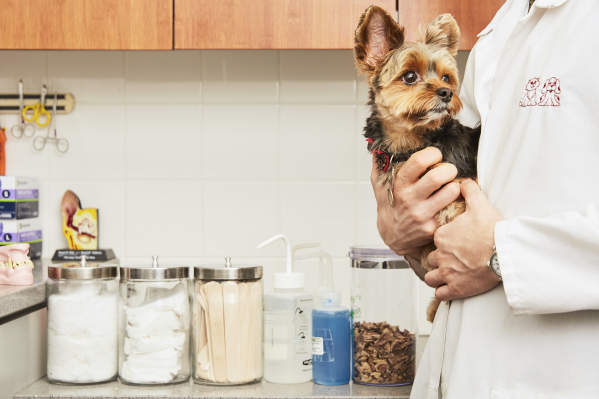Pets are part of your family. Most likely, every member of your family has health insurance, so you might be wondering: Should your pet have health insurance, too?
Pet insurance can help cover the cost of pricy medical procedures, treatments, and medications your pet may need. For some, the monthly cost of insurance can seem high — particularly if your pet is well and thriving and hasn’t needed unexpected veterinary care. For others, that monthly bill is preferable over an unexpected injury or illness, especially where treatment can be costly.
In reality, many pet owners don't realize that pet insurance is an option — or that costs can be an obstacle when it comes to keeping a pet alive and well — before it's too late. A study published in April 2017 in the Journal of the American Veterinary Medical Association showed that only 23 to 31 percent of veterinarians discussed pet insurance and the burden of veterinary costs with their clients before their pets became ill.
Don’t be afraid to initiate the conversation with your vet to get their input. “Most veterinarians definitely recommend health insurance for pets," says Cullen M. Dauchy, DVM, veterinarian at and former owner of Katy Veterinary Clinic in Katy, Texas.
What to Consider When Investing in Pet Insurance
Before you invest in pet insurance, follow these steps.
1. Choose a Reputable, Reliable Insurance Company
Do some research to make sure the company you’re planning to use is reliable and has a good reputation. According to the American Kennel Club (AKC), you should follow these steps to find a reputable pet health insurance company:
Ask who underwrites the insurance plan, look up that company's rating (choose one that has a rating of A, A+, or A++), and read online reviews.
Confirm that the company is licensed where you live.
Check how long the company has been in business, and how many customers are currently enrolled.
Review whether complaints have been filed with the Better Business Bureau.
2. Verify That The Company Covers Your Pet
Some pet insurance companies exclude certain breeds or types of pets when it comes to health insurance coverage. Before you purchase a plan, make sure the insurance company will cover your animal. Some pet insurance companies can refuse to cover animals or breeds that they deem as "high risk," including Pit Bulls, Rottweilers, Cane Corsos, and Tosa Inus.

3. Choose a Plan Your Vet Accepts
If you have a beloved family vet that knows you and your pet, consider whether or not you can use the plan at their practice. Not all pet insurance companies let you choose your vet, so check with your provider before you purchase coverage. This can be especially important if your vet is well-versed in the treatment or management of a condition that your pet has. Luckily, unlike human health insurance plans, most pet insurance plans won't lock you into a small network of providers, as they work with most vets.
4. Ask if They Cover Pre-Existing Conditions
If your pet has a health condition, you’ll want to purchase an insurance plan that covers pre-existing conditions, as not all insurance plans do. And if your pet's health troubles are caused by their condition — even if an urgent, acute condition can be linked to a pre-existing condition — the insurance company may refuse to cover the cost of care.
5. Bundle Insurance for Multiple Pets
If you have more than one pet, you may be able to bundle pricing and get a discount to insure multiple pets. If you are planning to purchase an insurance plan for multiple animals in your home, ask the provider about a discount for paying for multiple plans.

6. Think Twice About Insuring a Senior Pet
It’s a privilege to have a pet live into their senior years with you. However, once a pet is elderly, it may not make sense to pay for pet insurance coverage anymore. Certain health problems become inevitable for senior pets, such as:
Cancer
Heart disease
Diabetes
Kidney disease
Senility
Arthritis
At some point, if your senior pet’s health problems are causing them to suffer, it can make more sense to euthanize your pet. To determine whether your pet is still enjoying life, talk to your vet and go over a "Quality of Life" scale, which measures things like how hydrated they are, how much they eat, how happy they seem, and how mobile they are.
7. Review Payment Terms
You may consider buying pet insurance to help you avoid a large, unexpected vet bill. However, pet insurance doesn’t always help you avoid paying out of pocket, as many insurance companies require you to cover the cost upfront, then submit for reimbursement. This means that you'll still put down a large chunk of money up front, and insurance companies may take a while getting that money back to you.
8. Understand What Increases Premiums
A pet insurance company may raise your premium if you file a claim. Find out which claims will raise your premiums and which won't, so you can prepare for potential changes in your policy and fees. Many insurance plans won't change your premium at all — these plans are good options to consider.
Think It Over
Ultimately, your pet feels like a family member, and you may want to do all that you can to protect their health. That may include getting health insurance for your pet. Weigh the pros and the cons to determine if it’s a good fit for you and your pet.
